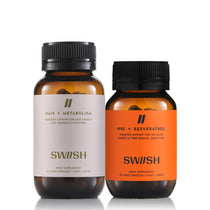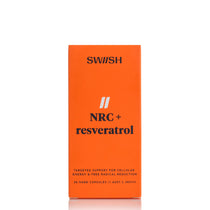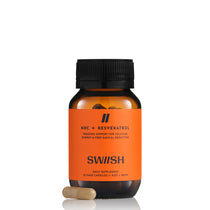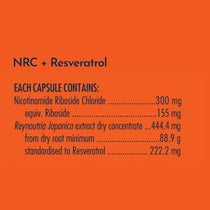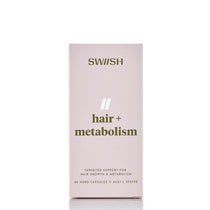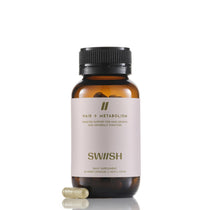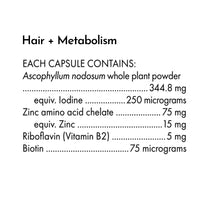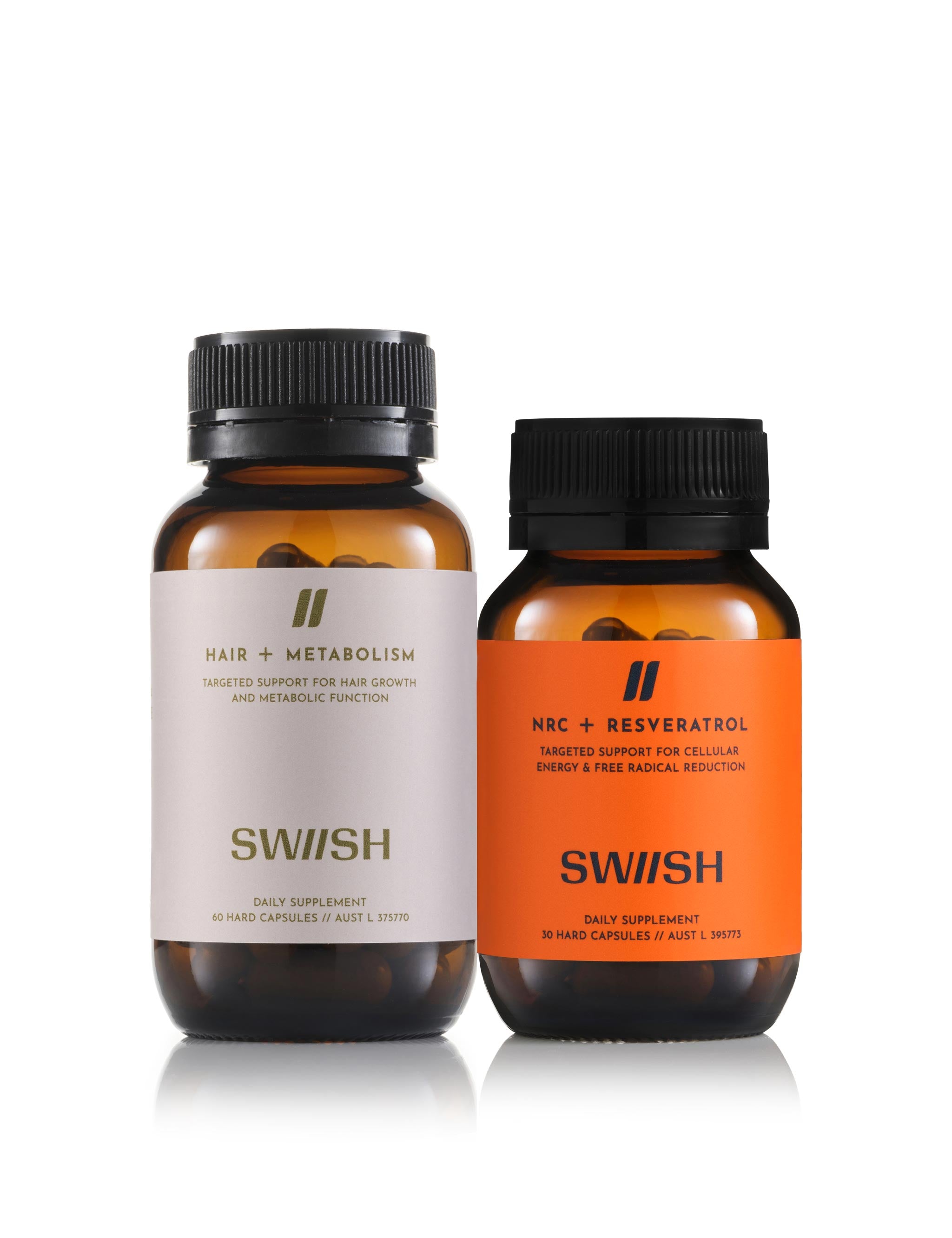
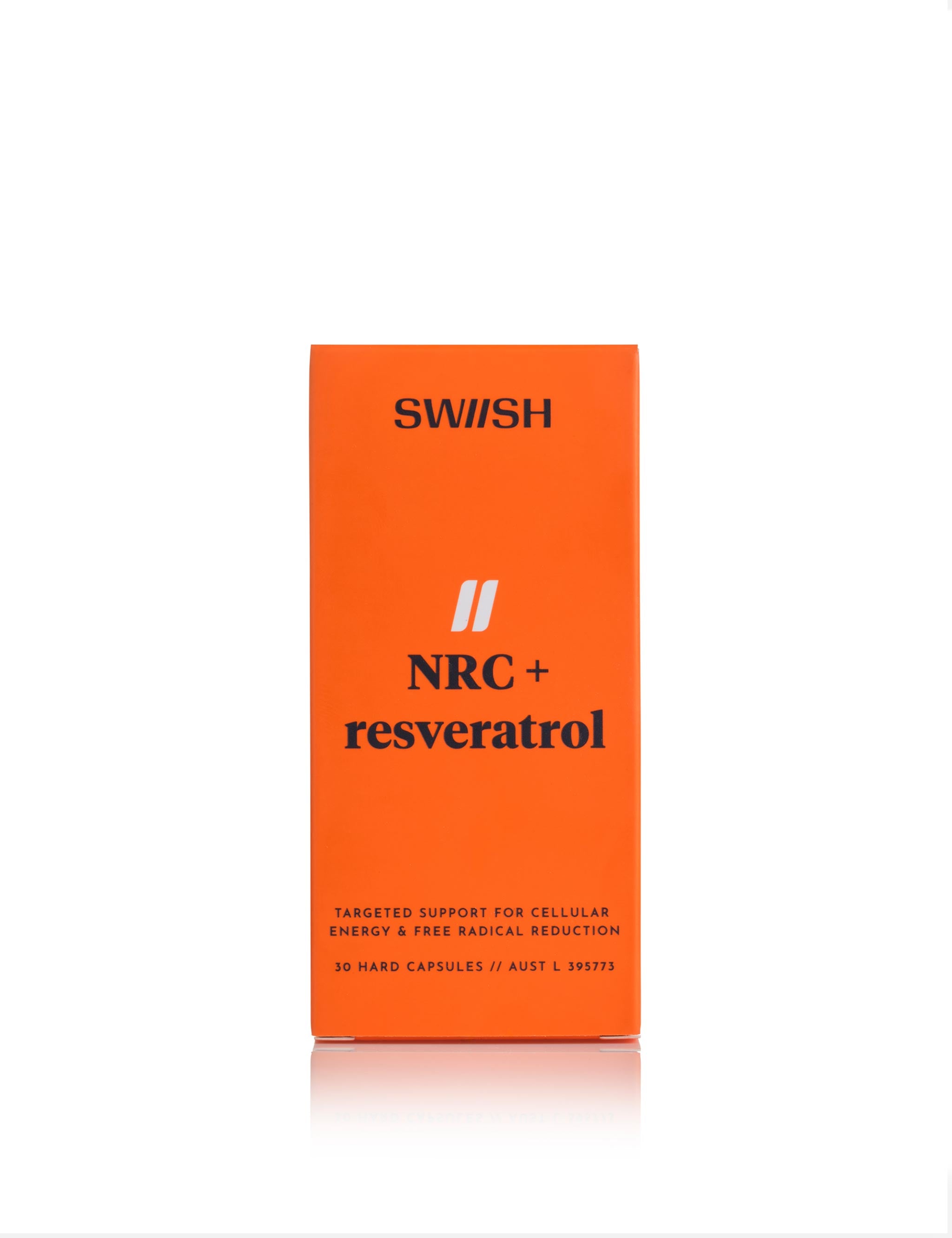
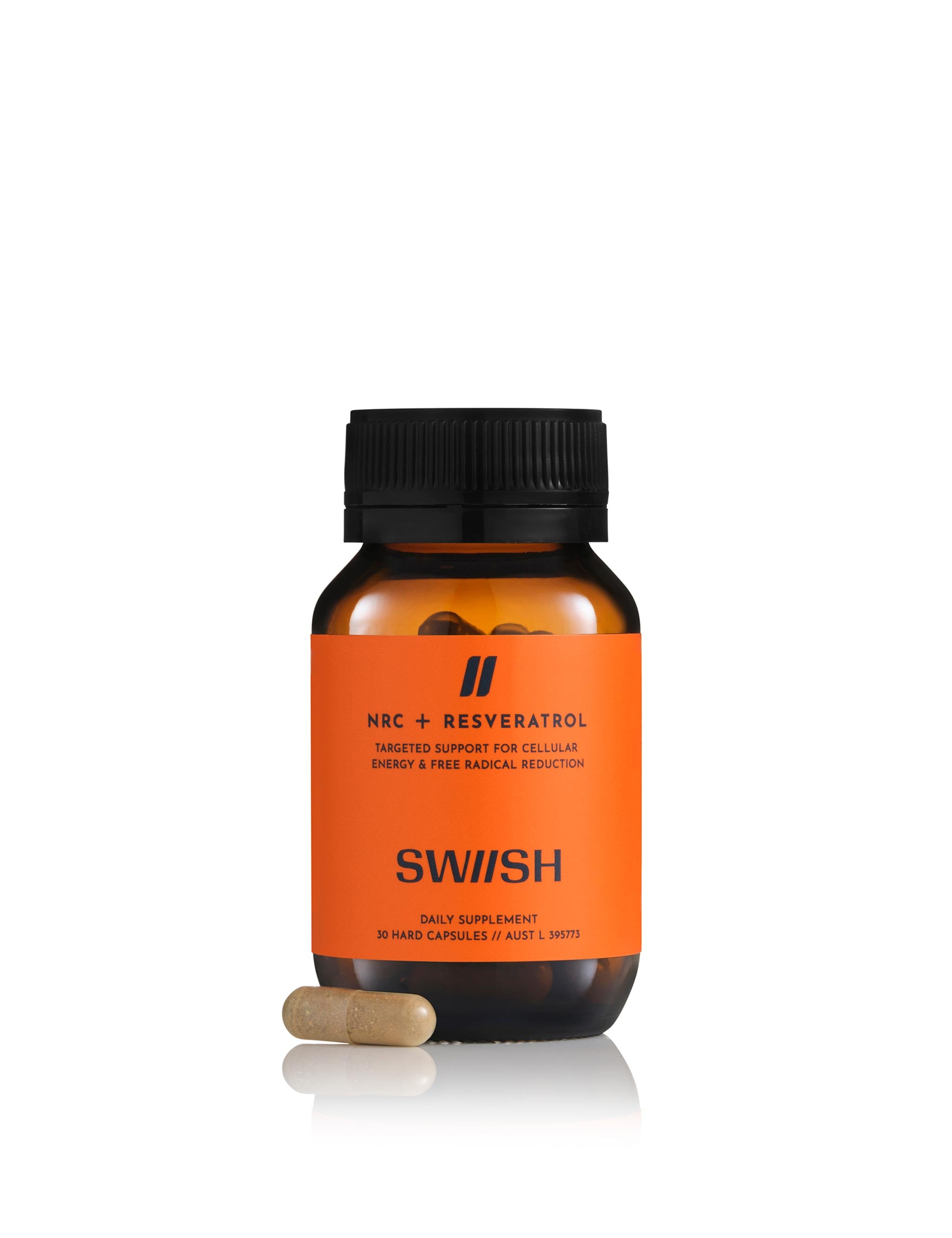

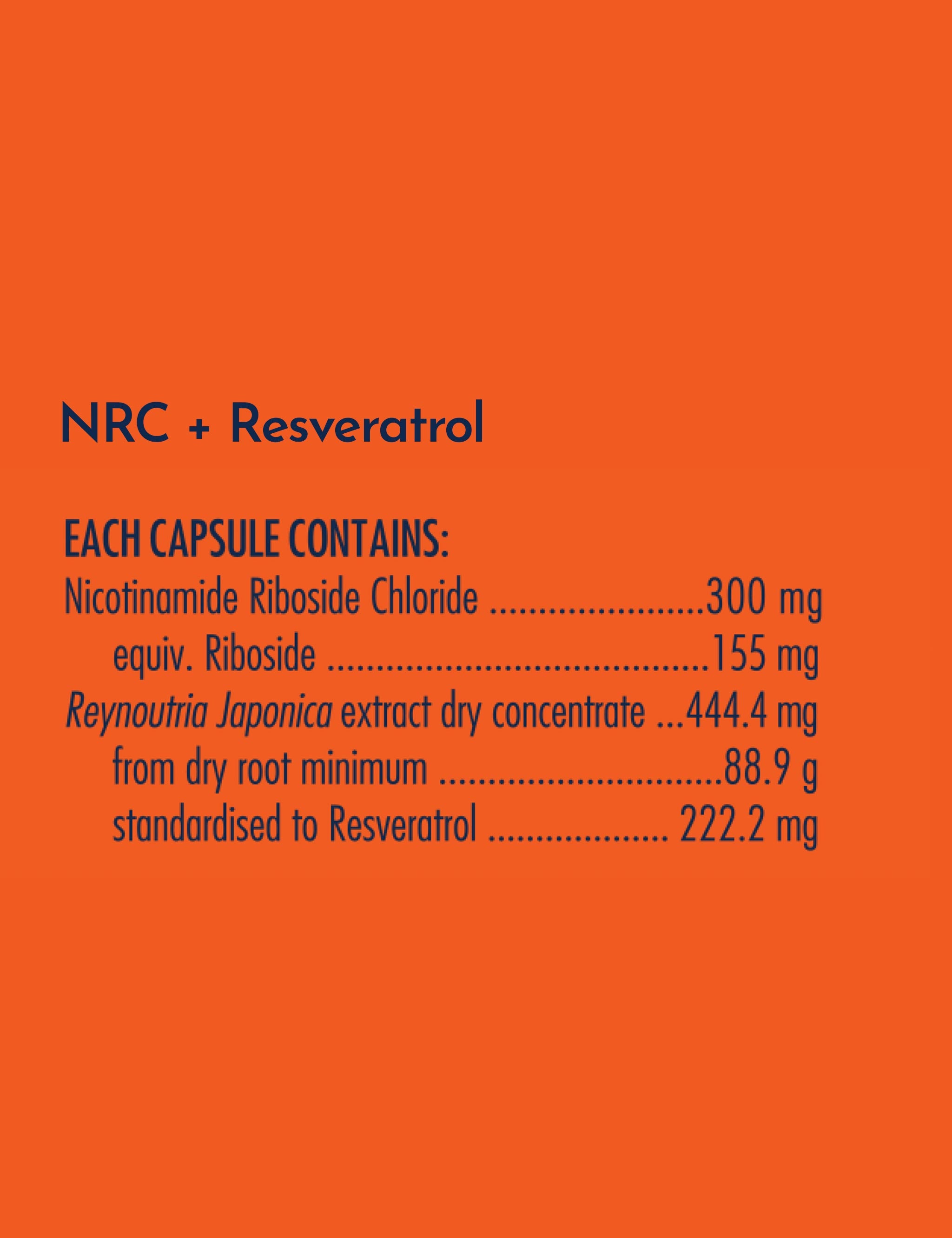
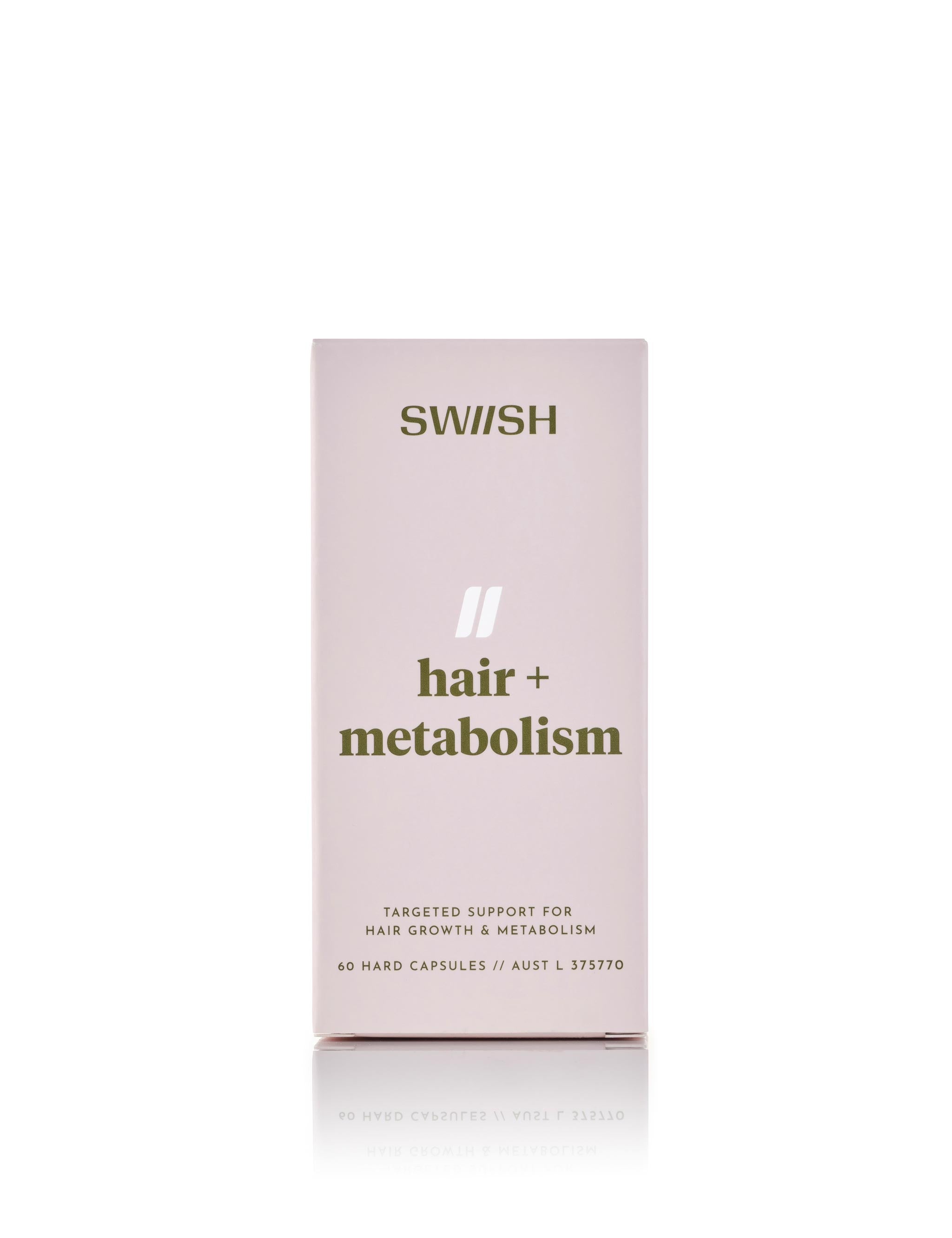
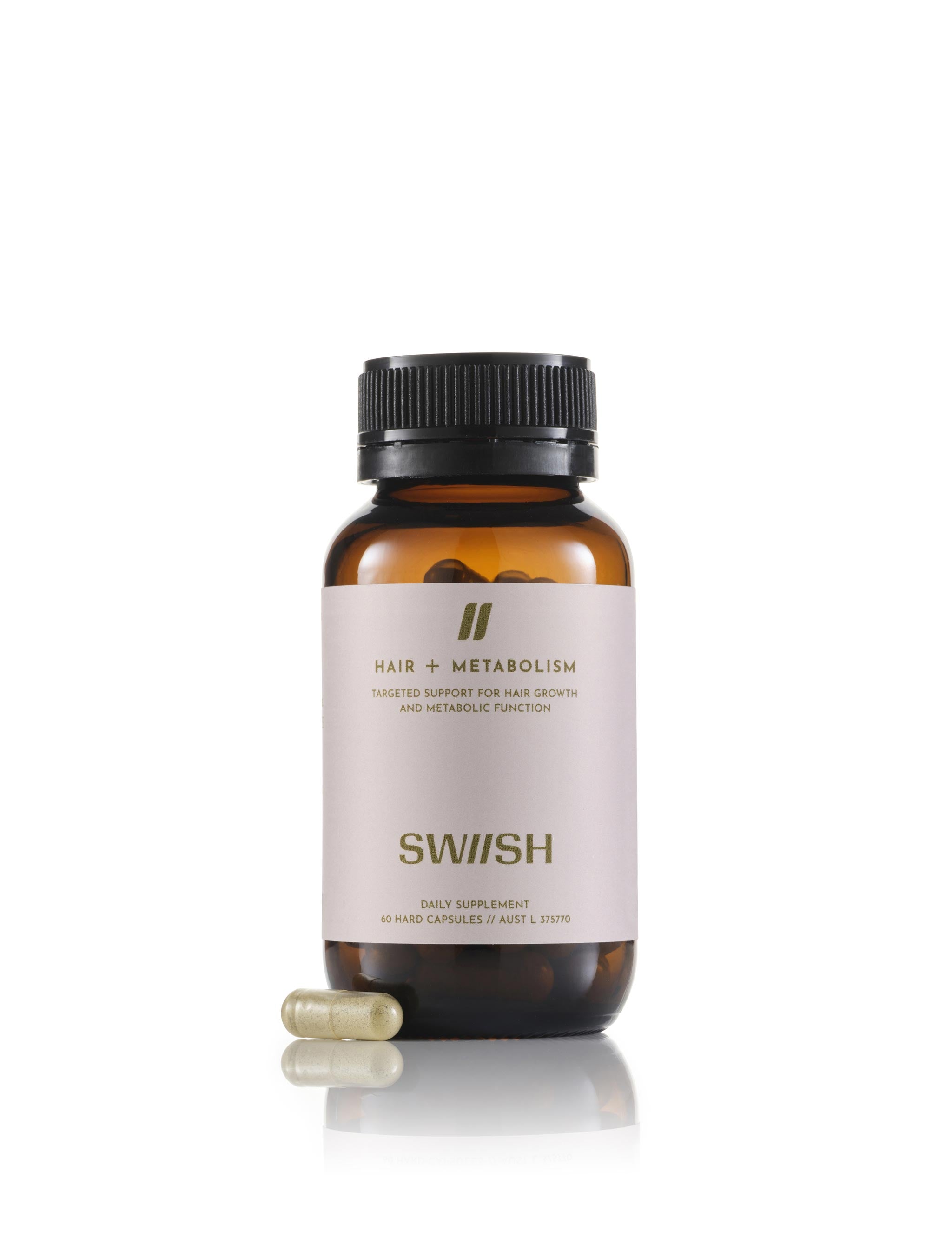

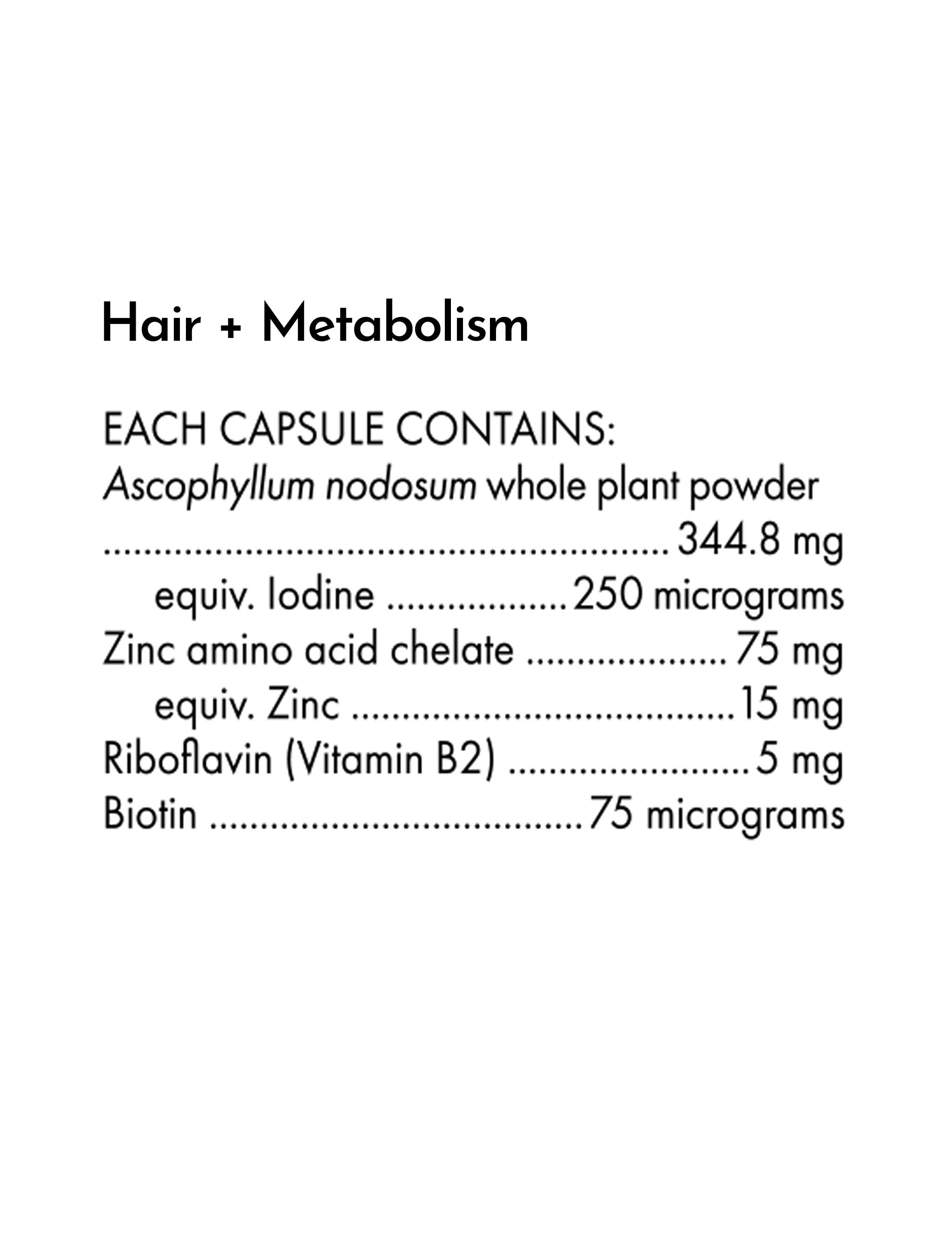
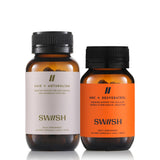
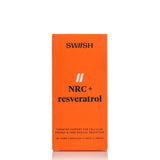
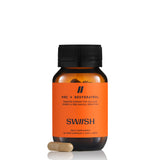

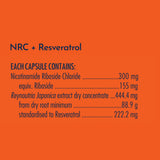
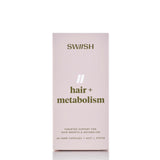
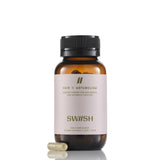

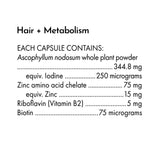
Longevity Plus
Boosts NAD+ and aids metabolism. NRC has been clinically proven to boost NAD levels by approximately 51% within 14 days. Resveratrol has been shown to mimic calorie restriction and this activates longevity pathways by signalling to proteins called sirtuins to start repairing DNA. Combine this with Hair + Metabolism which contains Iodine to aid overall body metabolism and metabolic rate.
Includes: NRC + RESVERATROL; HAIR + METABOLISM
Got questions? Check our FAQs below or email us at hello@swiish.com.au
Benefits
NRC + RESVERATROL
— Reduces free radicals formed in the body
— Supports energy levels and energy production
— Supports general health and wellbeing
— Supports nervous system function
— Supports skin health
HAIR + METABOLISM
— Supports metabolism
— Skin support
— Hair growth
— Hair health
Directions
Ingredients
NRC + RESVERATROL: Nicotinaminde Riboside Chloride 300mg, equivalent Riboside 155mg; Retnoutria Japonica extract dry concentrate 444.4mg from dry root, minimum 88.9g standardised to Resveratrol 222.2mg.
HAIR + METABOLISM: Ascophyllum nodosum whole plant powder 344.8 mg (contains iodine 250 micrograms); Zinc amino acid chelate 75 mg (equiv. zinc 15 mg); Riboflavin (Vitamin B2) 5 mg; Biotin 75 micrograms. Contains soya bean products and phenylalanine. We advise people with a fish and/or crustacean (shellfish) allergy to consider that the seaweed utilised in this product may have come into contact with fish and/or crustaceans in the sea.
♻︎ All SWIISH packaging can be recycled in your normal household recycling.
FAQs
What we leave out:
Free from gluten, dairy, lactose and nuts.
What is NAD and why is it important?
NAD is a vital enzyme involved in over 400 cellular functions. It helps protect the body from the ageing process and diseases. NAD levels decline as we age.
How can you address the decline in NAD levels?
The most efficient way to address declining NAD levels is through NRC supplementation, which is a precursor to NAD.
What benefits does resveratrol offer in the NRC + Resveratrol supplement?
Resveratrol, an antioxidant, complements NRC by fighting free radicals, mimicking calorie restriction and activating longevity pathways to repair DNA.
How do I know if my metabolism isn’t functioning at its peak?
Metabolic rate varies from person to person and can reduce depending on age, underlying medical conditions, extreme dieting, hormones, etc. It is important to consult with your healthcare practitioner to assess your individual metabolic function, however, some signs that your metabolism may be functioning slower than normal are:
— Fatigue & lethargy
— Weight changes
— Hair loss
— Mood changes
— Dry or troubled skin
— Brittle or weak nails
— Cognitive difficulty
— Sugar cravings
How long will it take for my metabolism to improve?
Results will vary from person to person as every individual is different, however, metabolism may improve after 30-60 days with consistent daily supplementation.
Can I have these products while pregnant or breastfeeding?
We don’t recommend SWIISH NRC + Resveratrol or Hair + Metabolism during pregnancy or breastfeeding. Please refer to the nutritional information & ingredients list.
Can I take NRC + Resveratrol with any other medications?
Resveratrol may affect the way some medications work, including Warfarin. We are unable to provide exact advice on whether it is safe to consume whilst taking other specific medications. As everyone’s situation is different, we recommend that you check with your healthcare professional to see if this supplement would be beneficial for you. Please refer to the nutritional information & ingredients list.
The Science
NRC + RESVERATROL — Effectively Enhances NAD+
Nicotinamide riboside is a natural compound that effectively enhances NAD+ biosynthesis and has health benefits. NR also offers an opportunity to boost NAD+ levels beyond what is achievable through conventional B vitamin metabolism.
(Yoshino J, Baur JA, Imai SI. NAD+ Intermediates: The Biology and Therapeutic Potential of NMN and NR. Cell Metab. 2018;27(3):513-528. doi:10.1016/j.cmet.2017.11.002)
NRC + RESVERATROL — Antioxidant/Reduces Free Radicals Formed In The Body
Resveratrol is a polyphenolic compound that exists in nature as cis-trans stereoisomers. Polygonum cuspidatum (Hu Zhang), the roots of which are used in Chinese and Japanese traditional medicine, is considered to be one of the richest sources of trans-resveratrol. In humans and laboratory research, resveratrol appears to reduce levels of oxidative compounds and protect against oxidation. Trans-resveratrol has antioxidant and anti-inflammatory activity.
(Gregory, P J, et al; Natural Medicines, Therapeutic Research Centre, February 2021)
NRC + RESVERATROL — Antioxidation, Anti-inflammation And Anti-Ageing Effects
Resveratrol possesses antioxidation, anti-inflammation, and anti-ageing effects.
(Banez et al., 2020)
A number of foods and their isolated components have been reported as valuable immunomodulators. Research has shown the abilities of a plethora of phytochemicals to stimulate, suppress and modulate both the innate immune cells, such as macrophages, dendritic, natural killer cells and acquired immune cells, that is B and T lymphocytes.
(Yahfoufi et al., 2018; Mileo et al., 2019)
The latter have the potential to prevent diseases in healthy individuals, as well as to alleviate symptoms in persons with compromised immune systems, mainly by regulating inflammatory responses and free radical scavenging activities.
(Bagchi D & Ohia S E, Nutrition and Functional Foods in Boosting Digestion, Metabolism and Immune Health, Academic Press, 2021.pp.467,506)
HAIR + METABOLISM — Metabolism
Metabolism refers to the process in which your body converts what you consume into energy. Metabolic rate is the speed at which it does this, measured by the amount of energy per unit of time that a person is able to process to keep their body functioning. Metabolism is often thought of as being interchangeable with the word digestion, but it is actually far more complex and widespread than that. Metabolism exists in every cell in the body, as each unique cell requires energy to do its job. Maintaining a good metabolic rate means each cell in the body is able to yield enough energy to carry out its role in the body – whether it’s a cell in skeletal muscle, the lungs, skin, gastrointestinal tract, etc. There are a number of factors that can slow your metabolic rate, they vary from stress and fad dieting to age, muscle mass, hormonal factors and more. Metabolic rate will also vary from person to person. When metabolism is slower, and/or you consume more calories than your body is able to convert to energy and use, the body is designed to store this excess energy in adipose tissue (fat cells). There are a number of nutritional minerals and vitamins that can support metabolism. Biotin is one of them, as it helps convert fats and carbohydrates (macronutrients from food) into energy. Beyond this, biotin is involved in energy–yielding metabolism and subsequent energy production.
(European Food Safety Agency. EFSA Journal. Biotin health-related claims. 2009; 7(9):1209)
Riboflavin is predominantly found as an integral component of coenzymes, flavin adenine dinucleotide (FAD) and flavin mononucleotide (FMN). FAD is an important component of the respiratory chain, closely involved in energy generation. It assists with releasing energy from food and moreover helps convert carbohydrates into adenosine triphosphate (ATP) — the carrier of energy within cells. As a B Vitamin, riboflavin is also involved in other metabolic energy–producing processes, including the citric acid cycle, as well as contributing to iron transportation and metabolism within the body.
(GlobinMed Monographs. Global Information Hub on Integrated Medicine. 2015)
(Gregory, P J, et al; Natural Medicines, Therapeutic Research Center, 2015)
Iodine is a trace element that supports thyroid function and energy production. The main function of iodine is to synthesise thyroid hormones triiodothyronine (T3) and thyroxine (T4). Thyroid hormones are involved in stimulating basal metabolic rate, as well as the production of body heat. Beyond this, thyroid hormones are also involved in cellular oxygen consumption/use used to produce ATP (which in turn supports metabolic rate).
(Braun L and Cohen M Herbs and Natural Supplements An Evidence-Based Guide, Vol 2. 4th ed. Elsevier. 2015. pp. 575-83)
(GlobinMed Monographs. Global Information Hub on Integrated Medicine. 2011)
HAIR + METABOLISM — Hair Health
Zinc has been studied for its ability to contribute to the maintenance of normal and healthy hair. Similarly, biotin (Vitamin B7) also assists in hair maintenance, growth and strength through its contribution to hair follicle formation. Beyond this, biotin assists with the regrowth of lost hair. Riboflavin (Vitamin B2) supports hair health as its flavoproteins (the building blocks of riboflavin) are essential for the growth of healthy hair. As a whole, riboflavin is necessary for the normal development and repair of numerous body tissues, hair included.
(EFSA Journal European Food Safety Agency. EFSA Journal Zinc related health claims. 2010;8(10): 1819)
(European Food Safety Agency. EFSA Journal. Biotin health-related claims. 2009; 7(9):1209)
(Braun L and Cohen M. Herbs and Natural Supplements An Evidence-Based Guide, 4th ed. Elsevier Mosby. 2015. pp. 1062-1070)
- Lea G.Verified BuyerI recommend this productRated 5 out of 5 starsBest combo
Best combo ever. You wake up and feel like you can take on the week ahead !
Was this helpful? - Evelyn S.Verified BuyerI recommend this productRated 5 out of 5 stars🧡
🧡
Was this helpful? - Charmaine H.Verified BuyerI recommend this productRated 5 out of 5 starsLove Resveratrol
I absolutely love these products - from having more energy to my skin looking amazing and just turned 60 - so that’s- a great side effect ❤️
Was this helpful? - Anna C.Verified BuyerI recommend this productRated 5 out of 5 starsLongevity Plus
Excellent products!
Just started on metabolism one a few days ago, I have been on NRC for a few weeks!
Energy a little better
Was this helpful? - Carole B.Verified BuyerI recommend this productRated 5 out of 5 starsLove this product
Love this my hair is amazing
Was this helpful?
- Related products

